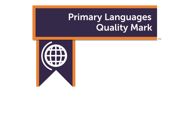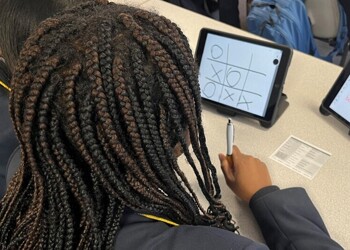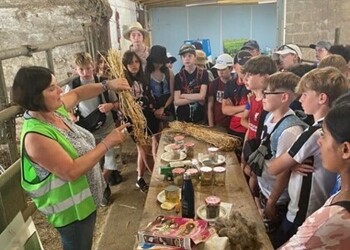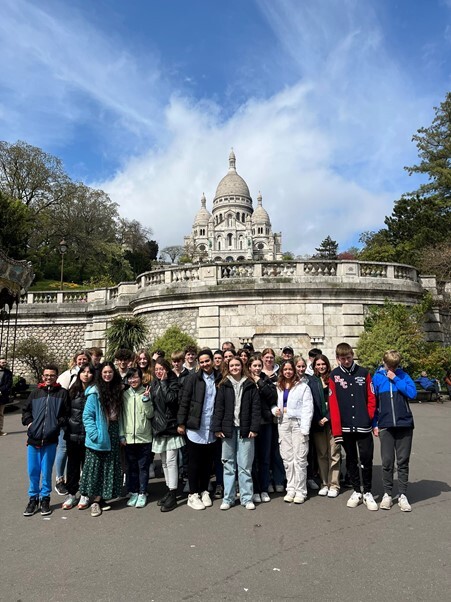Modern Foreign Languages - French
Through a range of engaging educational activities which focus on developing language awareness and practising listening and speaking micro-skills, we enable our pupils to grow into confident linguists who can perform real world communicative tasks with spontaneity and fluency. By continuously revisiting vocabulary and empowering pupils with the very best techniques that support memory, we nurture confidence in their ability, creating a positive mindset in language acquisition, regardless of their linguistic background. In this way, we foster analytical thinking, which enhances academic performance in other subjects.
Throughout the key stages, we practise the four key skills of communication - speaking, listening, reading and writing - whilst also offering regular opportunities for students to discover the cultures of French-speaking countries. We use digital technology both in lessons and for home-learning. Students are engaged and learn through games, group work, role play, competitions and a variety of digital applications. In addition to enrichment activities in class, year 7 students visit Northern France in the Summer term and year 9 students discover Paris in Spring. We are expanding our school trip offerings year-on-year, as we believe that it is important for students to be fully immersed in the French culture.
We are proud to have earned the Primary Languages Quality Mark Silver Level in 2020 and British Council International Schools Award Intermediate Level in 2020.

KS2
French at Key Stage 2 is lots of fun and focusses mainly on developing children’s confidence in speaking and oracy skills, aiming to encourage curious minds to think about how languages are formed and how people live in different cultures. French lessons start in year 3 with specialist language teachers delivering first-class lessons and providing continuity in terms of grammar and topics between Key Stage 2 and Key Stage 3. It will also challenge them in new ways as they will be expected to broaden their knowledge of vocabulary and expand their understanding of grammar. Technology is regularly integrated into lessons as students use their iPads to play interactive games to develop their knowledge of vocabulary and grammatical techniques. Sketchbook is also regularly used as a tool for whole-class teacher assessment and tasks are often uploaded to Seesaw for students to work interactively and become more independent learners. At the start of each academic year, children participate in learning and performing a song in French, inspiring an early enjoyment in language learning, whilst enhancing oracy skills.
|
|
Autumn Term |
Spring Term |
Summer Term |
|||
|
|
Sept/Oct |
Nov/Dec |
Jan/Feb |
Mar/April |
Apr/May |
Jun/Jul |
|
Y3 |
French greetings |
French adjectives of colour, size and shape |
French playground games – numbers and shapes |
In a French classroom |
French transport |
A circle of life in French |
|
Y4 |
Portraits – describing in French |
Clothes – getting dressed in France |
French numbers, calendars and birthdays |
French weather and the water cycle |
French food – miam! miam! |
French and the Eurovision Song Contest |
|
Y5 |
French monster pets |
Space exploration in French |
Shopping in France |
French speaking world |
Verbs in a French week |
Meet my French family |
|
Y6 |
French sport and the Olympics |
French football champions |
In my house |
Planning a French holiday |
Visiting a French town |
French film project – Le Petit Nicholas |
KS3
At Key Stage 3, we build a solid foundation of grammar and vocabulary, through studying topics relevant to our students’ daily lives; describing yourself and your family, describing your free-time activities, talking about where you live, visiting restaurants and discussing life in school as well as expressing opinions on lots of other relevant topics. We believe that cultural experiences form an essential part of language learning. As such, we offer a range of projects throughout Key Stage 3 to engage students in the French-speaking world. Our SCHOLAR drivers are present in every lesson, as students are encouraged to explore how the French language works, looking for patterns, lead discussions in groups and share their ideas. Students explore a variety of French language films, research customs and festivals in the French-speaking worlds, and enjoy preparing and tasting typical dishes. Technology is regularly integrated into lessons as students use their iPads to play interactive games to learn vocabulary and, in later years, grammatical techniques. Sketchbook is also regularly used as a tool for whole-class teacher assessment and task are often uploaded to Seesaw or OneNote for students to work interactively and become more independent learners, especially in year 9.
|
|
Autumn Term |
Spring Term |
Summer Term |
|||
|
|
Sept/Oct |
Nov/Dec |
Jan/Feb |
Mar/April |
Apr/May |
Jun/Jul |
|
Y7 |
Personal information and favourite objects |
Personality, family, school subjects and friends |
The world around me – school, home and animals |
Food and drink |
Local area, asking for and giving directions |
Town project work |
|
Y8 |
Lifestyle preferences |
Talking about past and ideal holidays |
Sport and leisure |
Daily life and helping others |
France and other countries |
French film project – La Guerre des Boutons |
|
Y9 |
Entertainment and advertising |
Technology |
A healthy lifestyle |
Describing my home and ideal homes |
Jobs and future ambitions |
French film project – Les Choristes |



KS4
At Key Stage 4, students deepen their understanding of grammatical concepts and enrich their range of structures and vocabulary through more in-depth study of familiar themes as well as the introduction of new topics such as healthy living, social issues, the environment and the use of social media. In addition to the GCSE taught curriculum, we offer a range of small-group sessions in year 11; some of which are aimed at honing exam skills, while others promote further study through A-Level taster activities. Our SCHOLAR drivers are again present in every lesson, as students dive deeper in their understanding of how the French language works in their consolidation of basic tenses and discovery of new tenses, looking for patterns, lead discussions in groups and share their ideas. Oracy continues to be embedded into every single language lesson, with students learning how to understand and produce the target language using both informal and formal registers through regular speaking and listening tasks. Our GCSE students aspire to achieve the highest grades as we work from the higher-tier course, teachers use adaptive teaching methods to ensure that all learners are achieving at least their full potential.
The GCSE course revisits and extends the topics from Key Stage 3, as well as introducing new and exciting topics such as social issues, festivals and the environment. As the GCSE course includes a wider range of topics and more challenging grammar, students become more confident in conversing in the French language.
The GCSE course and exam is structured into a number of key themes:
Identity and Culture:
Topic 1: Me, my family and friends
Topic 2: Technology in everyday life
Topic 3: Free-time activities
Topic 4: Customs and festivals in French speaking countries
Local, national, international and global areas of interest:
Topic 1: Home, town, neighbourhood and region
Topic 2: Social issues
Topic 3: Global issues
Topic 4: Travel and tourism
Current and future study and employment:
Topic 1: My studies
Topic 2: Life at school/college
Topic 3: Education post-16
Topic 4: Jobs, career choices and ambitions
Links to GCSE Specification
https://www.aqa.org.uk/subjects/languages/gcse/french-8658
|
|
Autumn Term |
Spring Term |
Summer Term |
|||
|
|
Sept/Oct |
Nov/Dec |
Jan/Feb |
Mar/April |
Apr/May |
Jun/Jul |
|
Year 10 |
Family and relationships |
Technology in everyday life |
Free-time activities |
Customs and festivals |
Home, town, neighbourhood and region |
Holidays and travel |
|
Year 11 |
Social issues – charity and volunteer work |
Global issues: environment, poverty and homelessness |
Life at school and college |
Career choices and future plans |
|
|

Beyond GCSE
Studying a French to A-Level at Samuel Ryder Academy will not only support you in getting the skills to be able to converse in a foreign language, it will also broaden your horizons, your knowledge of foreign cultures and develop your critical thinking skills on a range of topics. You will have the opportunity to study exciting topics in a supportive and a friendly environment while being intellectually challenged through the use of authentic material and discussions of current affairs. You will not only develop your French language skills, but you will learn how to summarise written or spoken passages, develop your critical, analytical and presentation skills and manage an extensive workload, preparing you for your university life.
Students have a weekly 1-1 session with a foreign language assistant. Home-learning is completed on a weekly basis and students complete 4 hours of independent study in addition to the home-learning during their study periods in school. Success students regularly read French news reports to ensure that they are up-to-date with the social trends and issues studied in lessons. Students maintain an organised folder and complete any improvements on teacher feedback, with folders checked at regular intervals throughout the course.
The A-Level course is split into a number of themes and sub-themes. Although these are studied one at a time, much knowledge of French society and issues is applicable in more than one theme and your understanding of French society, including specific examples, can be applied to a variety of situations. This course has three examinations:
Paper 1: Listening, reading and writing
Listening and responding to spoken passages from a range of contexts and sources covering different registers and adapted as necessary. All questions are in French, to be answered with non-verbal responses or in French (30 marks)
Reading and responding to a variety of texts written for different purposes, drawn from a range of authentic sources and adapted as necessary. All questions are in French, to be answered with non-verbal responses or in French (50 marks).
Translation into English: a passage of minimum 100 words (10 marks)
Translation into French: a passage of minimum 100 words (10 marks)
Written exam: 2 hours 30 minutes
100 marks
50% of A-Level
Paper 2: Writing
One question in French on a book, No et Moi, and one question in French on a film (La Haine) from a choice of two questions. All questions will require a critical appreciation of the concepts and issues covered in the work and a critical and analytical response to features such as the form and technique of presentation, as appropriate to the work studied (for example: the effect of camera work in a film).
Grammar is also assessed.
No access to texts, films or a dictionary during the assessment.
Students are advised to write approximately 300 words per essay.
Written exam: 2 hours
80 marks
20% of A-Level
Paper 3: Speaking
Individual Research Project
Discussion of a sub-theme with the discussion based on a stimulus card (5-6 minutes). 5 minutes preparation time (25 marks)
Presentation (2 minutes) and discussion (9-10 minutes) of individual research project (35 marks)
No access to a dictionary.
Oral exam: 21-23 minutes (including 5 minutes preparation)
60 marks
30% of A-Level
Awarding body: AQA
Specification number: 8658
Link to A-Level Specification
https://www.aqa.org.uk/subjects/languages/as-and-a-level/french-7652
Wider Curriculum Opportunities and Careers
Learning a language contributes to a sense of global citizenship as well as personal fulfilment. By nurturing curiosity and identifying similarities and contrasts with their own language, we strengthen our students’ understanding in other areas of the curriculum.
Through initiatives such as MFL week, we raise the profile of languages and encourage cross-curricular learning. Recent activities include: a theatre performance in French, food tasting events, arts and crafts activities, learning and performing songs in French for primary students and learning about how a second language may be useful in standing out within careers in the football industry for secondary students.
During MFL week, we also incorporate a variety of House events for students. Recent House events include: Modern Foreign Language Spelling Bee Competition for secondary students and a French Inventions Model Competition for primary students.
Our residential trips form an important part of the learning experience, so we are constantly expanding the range of trips to France offered to Samuel Ryder Academy students. Year 7 students visit Normandy whilst year 9 students enjoy the sights and culture of Paris before enjoying a day in Disneyland Paris.
At university, French can be studied on its own or as a joint/flexible honours degree with another subject, like English or Spanish (50% each subject). You will also find many Russell Group universities are now offering combined honours degrees allowing students to study maths, politics, history, art and many other subjects with a language. This provides students with the opportunity to do a third year abroad in a French-speaking country. Continuing a language at university is a skill in high demand in the employment market enhancing your career development and employability.
Useful Links
Grammar and Revision
|
|
Username and password supplied in lessons. Vocabulary, sentence building, exams skills and grammar exercises. Homework assignments are set her for KS3. GCSE and A-Level learners can access any of the resources to practise key skills. |
|
Grammar & exercises for independent learners to review tenses and other grammar points see in lesson. Topics at GCSE and A-Level. |
|
|
|
Interactive flashcards on any topic. Search the thousands of resources available. |
|
|
GCSE and A-Level vocabulary learning tool. Tests retrieval skills and progress. |
|
|
French grammar explanations for all key stages and exercises to practise your skills. |
|
Lots of grammar notes but no exercises |
|
|
|
A website which translates any verb in any form (F>E & E>F) |
|
Complements the GCSE course
|
|
|
http://revisionworld.co.uk/gcse-revision/french
|
Accompanies GCSE revision |
|
GCSE vocabulary practice
|
|
|
Beginners guide to GCSE French
|
|
|
|
From beginners to advanced (grammar) and KS3/4 topics |
|
Complements the GCSE course
|
|
|
A Level transition. Complements the GCSE course |
|
|
|
A great website for A-Level, lots of interactive materials |
|
|
Interactive revision materials |
|
|
A comprehensive search engine for French grammar (menu is in French but many of the exercises are in English). From year 7 to year 13 – all exercises are self-marking or interactive |
|
Develops an understanding of French slang for year 7 |
|
|
|
A search engine for synonyms in French |
|
www.uni.edu/becker/french31.html
|
Links to French websites |
Games and Vocabulary
|
|
Various language and vocabulary games |
|
www.memrise.com/course/52220/aqa-gcse-french-vocabulary
|
Complements the GCSE and A-Level courses
|
|
www.ashcombe.surrey.sch.uk/07-langcoll/02-MFL-resources.shtml
|
Complements the KS3 and GCSE course |
|
www.transparent.com/word-of-the-day/today/french.html
|
A new word and sound each day |
|
Christmas games and vocabulary |
|
|
Vocabulary learning up to GCSE
|
|
|
Make your own speaking avatar (need to register but free) |
Television and Radio Channels
|
|
General channel with news reports |
|
Lots of shows with the news |
|
|
Belgian TV with lots of listening/articles |
|
|
French MTV with French and international songs and interviews |
|
|
Serious channel but good for listening. Also, a great section on the French language (click: langue française then click: découvrir le français for all sorts of games & exercise for foreigners leaning French) |
|
|
French international radio station with lots of listening exercises and podcasts (with exercises/answers - book at langue française) |
|
|
Good music/news station in French (to listen online click: RTL en direct) |
Magazines and Newspapers
|
Fashion magazine |
|
|
Film/cinema magazine |
|
|
Celebrity news magazine |
|
|
French broadsheet newspaper |
|
|
Like the free Metro newspapers in the UK, short articles on French and world news, more accessible than the broadsheet papers |
|
|
|
Short reports (videos/news reports and podcasts) about French topics written by children in French. |
Youth
|
A general website for young people (music, articles, blogs, games, films etc) |
|
|
French football union
|
Listening and Reading
|
http://thefrenchblog.weebly.com/index.html
|
A good general website with a broad audience base |
|
A series of articles on the top 50 most famous French people |
|
|
Accessible articles (general and world news) A-Level |
|
|
www.francebienvenue1.wordpress.com
|
Lots of listening and reading A-Level |
|
www.coerll.utexas.edu/cmaj/home
|
Listening exercises with transcripts (in the form of interviews) |
|
Interactive revision materials
|
|
|
www.ashcombe.surrey.sch.uk/07-langcoll/02-MFL-resources.shtml
|
Great resources for listening, all levels |
|
Listening and videos from year 7 to year 13 |
|
|
Good French section, a bit of everything
|
|
|
Try the karaoke section aimed at A-Level
|
|
|
|
Advanced level mp3 recording on many topics (also German & Spanish)
|
|
TV adverts from France and other countries
|
Study Skills for Language Learning
|
http://www.open.ac.uk/skillsforstudy/taking-notes-for-languages-students.php
|
Aimed at Open University students, a good site to help you learn more efficiently
|
Dictionary
|
A very reliable website with numerous examples; other languages also offered |
|
|
A great website with lots of idiomatic examples |






















